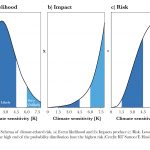 September 18, 2018 9:59 am
Published by Jenny Rislund
September 18, 2018 9:59 am
Published by Jenny Rislund
Climate change is affecting weather patterns in many locations. In East Africa, changing rainfall would challenge the livelihoods of farmers. However, perceptions of local farmers and data from local weather stations differ. Is rainfall changing? How can we understand these two important information sources?
 September 14, 2018 11:22 am
Published by Jenny Rislund
September 14, 2018 11:22 am
Published by Jenny Rislund
Heatwaves have increased in their intensity, frequency and duration. It is now well-established that heatwaves are not stand-alone events, but occur in the presence of other extremes, such as, droughts, extremely high atmospheric pressure, or teleconnections to other atmospheric phenomena. The PhD will undertake a novel examination of the attribution of heatwaves, coincident with other plausible extreme events.
 September 11, 2018 1:07 pm
Published by Jenny Rislund
September 11, 2018 1:07 pm
Published by Jenny Rislund
This paper shows that many models overestimate the interaction between hot and dry conditions in wet regions and therefore overamplify heat extremes. The study points to necessary model improvement to increase confidence in future projections of heat extremes.
 August 23, 2018 2:34 pm
Published by Jenny Rislund
August 23, 2018 2:34 pm
Published by Jenny Rislund
This paper examined the likelihood of extreme marine heatwaves global using climate models simulations, with and without anthropogenic influences, concluding that these events were up to fifty times more likely due to anthropogenic climate change.
 August 21, 2018 10:55 am
Published by Climate Extremes
August 21, 2018 10:55 am
Published by Climate Extremes
This report is not intended as a “science paper”, rather its designed to translate science into action and highlight risks in the way businesses, the military and emergency services should treat risk when it becomes existential.
 August 15, 2018 12:12 pm
Published by Climate Extremes
August 15, 2018 12:12 pm
Published by Climate Extremes
The study finds important regional consequences for precipitation and clouds formation if large changes in dimethyl-sulfide emissions were to occur. In a hypothetical case where all marine DMS emissions cease completely, we find the Earth would warm by approximately 0.5 degrees C over a ten-year period.
 August 15, 2018 10:43 am
Published by Climate Extremes
August 15, 2018 10:43 am
Published by Climate Extremes
CLEX researchers found that counter-clockwise rotating eddies in the Southern Ocean mix the ocean deeper in winter, allowing more nutrients to enter their interiors, leading to higher productivity. This work is important because eddy productivity plays a significant role in the exchange of carbon between the ocean and the atmosphere.
 August 14, 2018 6:27 pm
Published by Jenny Rislund
August 14, 2018 6:27 pm
Published by Jenny Rislund
Using France as a case study, this project aims to create a climatology of heatwaves and droughts to investigate possible connections with voting patterns. The ultimate goal would be to help predict voting patterns in the future and to see whether the techniques could be applied more widely to other countries.
 August 14, 2018 6:25 pm
Published by Climate Extremes
August 14, 2018 6:25 pm
Published by Climate Extremes
In this project the vacation scholar will use models, observations and theory to better understand the processes driving ocean heat uptake in the Southern Ocean, with particular applications to sea-level rise.
 August 14, 2018 5:59 pm
Published by Climate Extremes
August 14, 2018 5:59 pm
Published by Climate Extremes
This project will use output from a large ensemble of state-of-the-art climate models to examine changes to the Indian Ocean circulation and how it links to changes projected for the Pacific and Atlantic basins and surface winds.










